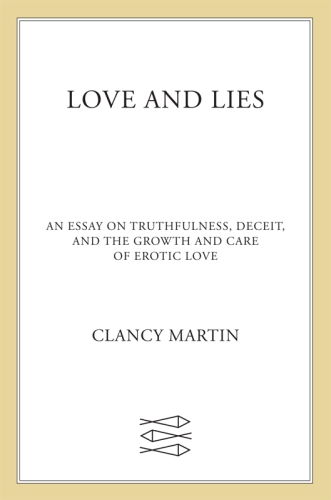
Love and Lies
An Essay on Truthfulness, Deceit, and the Growth and Care of Erotic Love
کتاب های مرتبط
- اطلاعات
- نقد و بررسی
- دیدگاه کاربران
نقد و بررسی

January 5, 2015
Martin (How to Sell) probes the insidious relationship between lying and love in a sometimes frustrating but often brilliant book, extolling the ways in which lying can make us better lovers. This is no easy how-to manual, though; Martin’s sources include Plato, Aristotle, Kant, and Nietzsche, among others. One of his most provocative proposals is that we first discover the intertwined relationship between love and deception as children. Remembering his own experience of first love, Martin argues that this process often involves an element of self-deception. In his view, the connection between lying and love is not necessarily bad: “Most of the deceptions we practice in erotic love do not have the goal of harming the beloved.” In the end, Martin asserts, “How, when, and why we sort out the right kind of lying from the right kind of truth telling... are a lifetime’s pursuit.” At times, his tone comes across as overly lofty, and at others, emotionally inauthentic—readers may suspect he is less worldly than he suggests. Nonetheless, Martin’s conclusions about the nature of love and lies succeed in boldly challenging conventional views. Agent: Susan Golomb, Susan Golomb Agency.

November 1, 2014
An admitted liar muses about deception.Philosopher, essayist and novelist Martin (Philosophy/Univ. of Missouri, Kansas City; How to Sell, 2009, etc.) expounds on love, sex and lying in this digressive, interesting, but sometimes exasperatingly narcissistic book. At 46, married three times, divorced twice, a recovering alcoholic and, the author confesses, a lifelong liar, he wrote this book "to figure out how I've loved and how to do it better. More brutally put-and more honestly?-I am trying to behold my body and my heart without disgust." That question mark is unsettling: What, readers may well wonder, is true? Martin recounts his first love, of his sister, a disturbed girl several years older than he; his first erotic experience when he was a child and brushed against his mother's buttocks; his first sexual experience, in high school, in all its kinky details; and his halfhearted suicide attempt. He insists that lies pervade all relationships and that liars are more intelligent than nonliars, supporting his assertions with "studies" as likely to be found in newspaper reports as in academic journals. He maintains, for example, that "the capacity to lie convincingly is a reliable predictor of social and financial success among adults." "By the time we are two or three," he says, "we are telling people what they want to hear-or what we think they want to hear. The best liars must also be mind readers." Among the wide range of writers and thinkers Martin draws upon are Socrates and Plato, James Joyce and Raymond Carver, Nietzsche, Kant, Stendhal, Freud, of course, and the Freudian psychiatrist Adam Phillips, Montaigne, Machiavelli and even the charming liar Pinocchio. An intelligent, if at times self-aggrandizing, celebration of lying and love.
COPYRIGHT(2014) Kirkus Reviews, ALL RIGHTS RESERVED.

February 1, 2015
Martin (philosophy, Univ. of Missouri-Kansas City; How To Sell), using examples drawn from literary sources, philosophical arguments, and personal experiences, argues that lies and deception (including self-deception) are inextricably bound with love. He describes in five chapters how this comes to pass through looking at the experience of love as presented in childhood, our first love, erotic love, and marriage. In each instance the author shows that our love, and its maintenance, is based on subjective meaning of the truth instead of the absolute truth. Indeed, if absolute truth was the true object of love, he argues, the emotion would not survive. Thus, his conclusion is not that love will lead us to truth but that our experiences of it teach us that love is neither a moral absolute nor a mythical concept but a subjective experience. While the chapters concerning first love and childhood are the strongest supporters of his premise, overall, Martin offers a persuasive and absorbing argument. VERDICT Since the reader needs some background knowledge of philosophy, this title is recommended for serious students of philosophy (upper-level undergraduate to graduate level) who will find the argument fascinating.--Laura Hiatt-Smith, Douglas Cty. Libs., CO
Copyright 2015 Library Journal, LLC Used with permission.

























دیدگاه کاربران